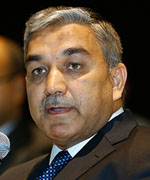With the price of oil showing signs of declining further, the IMF foresees the UAE as posting its first fiscal deficit in six years. Considering the havoc the economic woes of 2009 caused, do the HVAC and construction industries have reason to worry? Experts say the outlook is dim but not dark.
In early June of this year, Reuters released a story echoing what some in the local media – based on speculations from economists and results of bank-financed research – have been reporting as early as last year: the UAE is headed for a fiscal deficit.
According to the International Monetary Fund (IMF), Reuters’ source for its story, the country’s consolidated fiscal balance, which netted a surplus of five per cent of gross domestic product (GDP) in 2014, is expected to suffer a 2.3% shortfall this year due to falling oil prices. In announcing its forecast, the IMF also pointed out that the deficit will be the UAE’s first since 2009 – a year that financial analysts and business leaders associate with market instability and profit loss.
With grim associations such as those still in people’s minds six years later, should the IMF announcement be a cause for concern for those in the construction and the HVAC sectors?
Not a gloomy picture

Asim Hashmi, Sales Director, Applied, SKM Air Conditioning
For Asim Hashmi, Sales Director (Applied) at SKM Air Conditioning, the bad news from the IMF should, indeed, be met with concern – but only concern and not alarm. “The situation is not so bright, right now, but it is not so gloomy, either,” he said, adding that he has observed the HVAC market slowing down.
“Beginning last year, there’s been slow movement in the market,” Hashmi said, before further sharing that he expected the situation to continue on until 2016. “Projects will slow down, and government spending will go down. I mean, there are projects on the table now, but players will be reluctant. Everybody will be reluctant.”
The reluctance, he said, was not only the result of the decline in the price of oil and the anticipated fiscal deficit but also the result of unrest in other Arab nations. “Because of war, people are holding on to their money,” he said. “Conflict is creating uncertainty about the region.”
Business as usual

Samir Thabet, Sustainability Coordination Manager, Consolidated Contractors Company
Samir Thabet, the Sustainability Coordination Manager at Consolidated Contractors Company, agreed with Hashmi’s observation about the impact of war on business, but he clarified that in the case of his company, only offices in the countries affected by the unrest have felt the said impact. The UAE office, he revealed, has been business as usual, even with the looming fiscal deficit.
Thabet said that although projects were not as many as they expected, they were still coming in. He also shared that while oil prices may be slowing down decisions for new projects, he believed that they were in a good position. “This year is turning out better for us than 2014, and we are expecting growth in 2016,” he said.
The anticipated deficit, Thabet stressed, has had and will have no considerable impact on the construction industry.

Mohammed Khaja, Product Leader for Unitary Systems at Trane
Mohammed Khaja, Product Leader for Unitary Systems at Trane, admitted to holding a similar optimistic view when asked if he foresaw the fiscal shortfall affecting the HVAC industry.
“I don’t think there will be any impact,” Khaja said. “So far, activity has been normal, and we’ve been getting the same enquiries. Also, a lot of projects that were put on hold in the past have been activated, and there are a number of new ones coming in, such as the MBR (Mohammed Bin Rashid) City, which is a multi-million-dollar development project.”
For Khaja, the lack of noticeable impact on the industry can be partly attributed to Dubai’s diversified economy and Abu Dhabi’s vast reserves. “The major development projects in the UAE are in Dubai and Abu Dhabi,” he pointed out. “Dubai, with its diversified economy, is not dependent on oil. Abu Dhabi, meanwhile, has a deep well of reserves and is working on a lot of large Estidama projects. I heard that it also has its own multi-billion project in the form of premium villas. Around 10,000 villas, if I’m not mistaken.”
Thabet attributed the sanguine state of affairs to the foresight of the government. He gave the credit to the government, saying that as a result of 2009, “many regulations were introduced to better control and stabilise the market, and improve the economy”.
Lessons learned

Eng Anwaar Al Shimmari, the Director of the Projects Planning Department at the UAE Ministry of Public Works
Maintaining that the 2009 crisis and its ill-effects were well behind the country, Eng Anwaar Al Shimmari, Director of Projects Planning Department, at the UAE Ministry of Public Works, expressed confidence that the UAE government is every bit prepared to handle what is coming.
Sounding the caveat that she was not speaking on behalf of the government but only stating a personal opinion, Al Shimmari said: “I’m not going to say that another fiscal deficit will not have any impact on project planning, because it would. There will definitely be an impact, but the government will make sure that it will be minor. Even during the 2009 crisis, the support from the government was really strong. And it also worked hard to ensure that the private sector would not be jeopardised. Today, the government is determined that there will be no repeat of 2009.”
To support her statement, she disclosed that no projects of the Ministry of Public Works have been or will be shelved as a result of the news from the IMF. “The projects are in the pipeline, and the cash flow is set for the next three years,” she said. Elaborating, she added, “We, together with the Ministry of Finance, have put together some plans, and we have worked this out in the last two years to ensure that the cash flow is properly maintained for the projects.”
While many in the business community would rather scrub their memories of the national and global economic situation of six years ago, Al Shimmari said that 2009 did leave behind one positive impact: it has made the UAE government better equipped to handle similar situations. “Of course, it’s always better when you are ready, because it allows you to expect things, and you can have contingencies,” she said. “Negative situations can be turned positive by learning from them. When you end up with lessons learned, you become ready to face any future issues you might encounter. And – again I’m stating my own opinion here – I think that’s the case with the government. They did a wonderful job of taking us from 2009 to now, and they will do an even better job at taking us past this minor hurdle.”
Copyright © 2006-2025 - CPI Industry. All rights reserved.